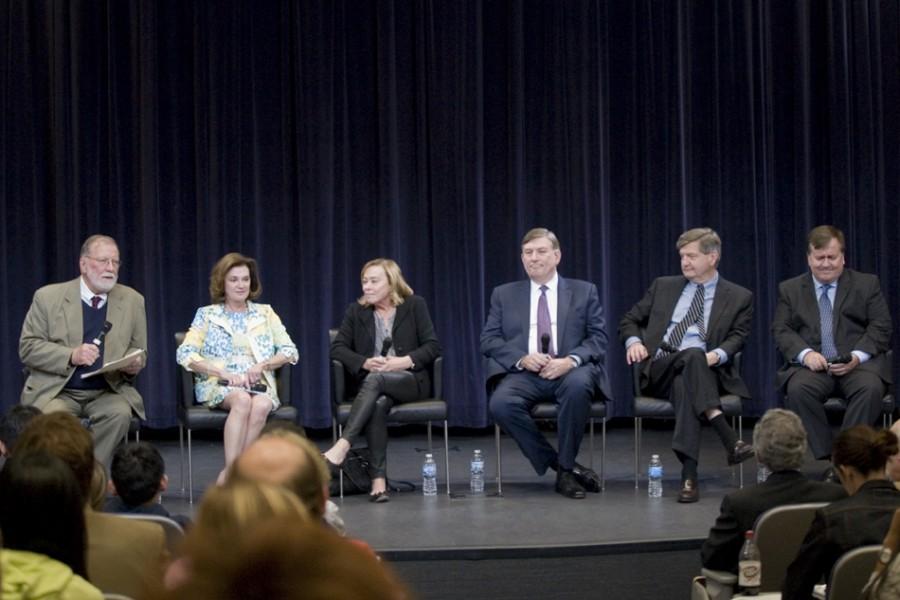Medill alumni discuss careers, future of industry at Hall of Achievement panel
Sylvana Caruso/The Daily Northwestern
Medill Prof. Timothy McNulty (left) moderates a panel of inductees into the Medill Hall of Achievement. The alums discussed their experience at Northwestern and in their respective fields and how they see those fields changing.
May 14, 2015
Five inductees to the Medill Hall of Achievement discussed lessons they learned during their time at Northwestern and in their respective industries at a panel Thursday.
The five speakers, as well as author George R.R. Martin (Medill ‘70,’71), were chosen as this year’s honorees for the Hall of Achievement, an award established in 1997 to honor Medill alumni who have had distinctive, positively impactful careers. The panel drew a packed audience in the McCormick Foundation Center Forum. Martin will visit NU this fall.
New York Times journalist James Risen (Medill ‘78), has been making international headlines for his involvement in a seven-year legal battle with the U.S. government over the identity of a source. His source, Jeffrey Sterling, was sentenced to three and a half years in prison after he was convicted of violating the Espionage Act. Sterling, a former CIA officer, was charged with providing Risen with details about a botched operation to disrupt Iran’s nuclear program. Risen described the operation in his 2006 book “State of War.”
“(President Barack Obama’s) national security beliefs are closer to Bush than he ever let on in the campaign,” Risen said. “As I’ve said before, he is the greatest enemy of press freedom we’ve had since Richard Nixon.”
Risen, who would not comment on Sterling’s conviction, also talked about changes in the journalism industry, particularly with the rise of the Internet and citizen journalism. He said citizen journalism has benefits but can also lead to a lack of credibility as people can post without the benefit of the editing process of major news organizations.
“I think the Internet has opened up an enormous number of opportunities for people to get involved in writing for publication,” Risen said. “It’s broken down all the systems in journalism and forced everyone to rethink how we do it.”
David Barstow (Medill ‘86), a Pulitzer-winning journalist with The New York Times,
recalled the best piece of advice he received during his undergraduate career, from former Medill Prof. David Protess, who later directed the Medill Innocence Project.
Barstow said Protess told them to be wary of getting so focused on the facts of a story that they miss the big picture.
“I think that’s still one of my biggest fears, is writing a story that you couldn’t find a single factual mistake in it but that it adds up to something that’s just completely wrong,” Barstow said.
Barstow also expressed concern about changes in journalism, but said he was nonetheless hopeful about the future of the industry.
The Internet has also impacted the film industry, as people are moving away from seeing movies in theaters, said Nancy Utley (Medill ‘77, ‘78), president of Fox Searchlight pictures.
“I think eventually … (movies) will be available across platforms at the same time,” Utley said. “The consumers made it clear that they want what they want when they want it, and we’re going to have to adapt to that in some way or face being an obsolete form of communication.”
The panelists also discussed the different directions they took to reach their current careers, which Medill Prof. Timothy McNulty, who moderated the discussion, said is one of the most valuable aspects of the Hall of Achievement panel.
“Their past is very much like students’ futures,” McNulty told The Daily. “It isn’t always a straight line — exposing people to the wonderful careers that people can have after graduation is a value in itself.”
The panel also included Jack Modzelewski (Medill ‘80), president of the Americas for communications firm FleishmanHillard, and Patricia Blackburn (Medill ‘74,’76), a corporate communications consultant who formerly worked with several major global corporations.
Medill graduate student Taylor Hall said she appreciated hearing the panelists had varied experiences before finding success.
“It’s always encouraging to see that they didn’t start where they are now,” said Hall, a student of McNulty’s. “They all gave great advice about their careers.”
Email: [email protected]
Twitter: @MadelineFox14












